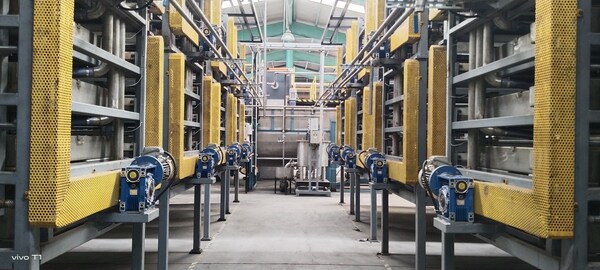ACE Green completes successful handover of emissions-free lead recycling facility to ACME
TAIPEI, Jan. 14, 2024 /PRNewswire/ — ACE Green Recycling (ACE) has successfully delivered the first of three phases of its proprietary zero-emissions modular lead battery recycling technology to ACME Metal Enterprise’s facility in Keelung City, Taiwan. As part of the agreement, ACE will provide equipment and proprietary chemicals to enable ACME to produce “GreenLead™” in a safe, sustainable and economical way. This marks the second successful deployment of ACE’s pioneering lead battery recycling technology.
ACME is Taiwan’s leading lead recycler, with over 40 years of successful operation. Through its partnership with ACE, ACME will become one of the largest producers of emissions-free lead, with a capacity to recycle 20,000 metric tonnes per year of lead batteries to produce about 12,000 metric tonnes of environmentally friendly “GreenLead™“, generating nearly USD 24 million in annual revenue for the Taiwanese company.
Of the deal, Linus P. Lu, Managing Director of ACME, said: “We are excited and pleased to have successfully completed the installation of ACE’s lead battery recycling technology at our facility. This marks an important milestone for ACME as we build our capacity to provide sustainable lead recycling capabilities – not just for our company but for the entire lead battery ecosystem as well.”
Lead batteries are a key element in the automotive and telecoms industries, while also playing a crucial role in the energy transition for renewable power storage. Traditionally, lead batteries are recycled via a smelting process which involves operating temperatures of over 1,000°C, producing significant greenhouse gas (GHG) emissions, plus toxic solid waste that must go to landfill.
ACE’s room temperature recycling technology replaces the smelting furnace, is electrically powered, has zero Scope 1 GHG emissions and reduces solid waste by over 85%. The process will greatly enhance ACME’s profitability and minimize their operator and environmental risks.
Phase I of the agreement for 2,400 metric tons per annum was successfully handed over to ACME in December 2023, with Phases II and III to increase annual capacity to around 20,000 metric tonnes, which will proceed later this year. During the 10-year contractual duration of 10 years, these facilities will enable the recycling of over 14 million scrap batteries. This will prevent the emission of nearly 120 million kilograms of CO2e, stop 18 million kilograms of solid waste from going into landfill and enable recycling of more than 14 million kilograms of plastics, while providing high-paying, sustainable green jobs for the community.
This collaboration with ACME demonstrates ACE’s deep commitment to the battery market. Sales of GreenLead™ from ACME’s facility will reach the key markets of Taiwan and Japan, including leading battery OEMs across Asia.
“It is our goal as a battery recycling technology platform to provide all players in the ecosystem a way to meet not just their commercial goals but their environmental ones as well,” said ACE Green CEO Nishchay Chadha. “We develop our carbon-free recycling technologies to meet the industry’s global aspirations to be responsible stakeholders in the mission of meeting net-zero targets.”
Lead batteries remain an essential component of global electrification. By successfully deploying its green solutions, ACE will continue to support and champion the lead industry and provide not just a profitable solution, but a sustainable one for all secondary lead producers.
ACE is a market leader in both lead and lithium-ion battery recycling technologies and is partnering with companies worldwide to help them set up environmentally friendly battery recycling facilities. The company has a team of over 70 people and is dual headquartered in the US and Singapore.
Forward-Looking Statements
This document contains certain forward-looking statements regarding ACE’s technological capabilities and future business aspirations. All statements are based upon current ACE expectations and involve a number of business and technical risks and uncertainties that could cause actual results to differ materially from anticipated results described, implied or projected in any forward-looking statement, including, without limitation, regulatory approvals, unexpected changes in technologies, uncertainties inherent in technological development, scaling and roll out, intellectual property protection, and sources and availability of third-party financing.
SOURCE ACE Green Recycling

